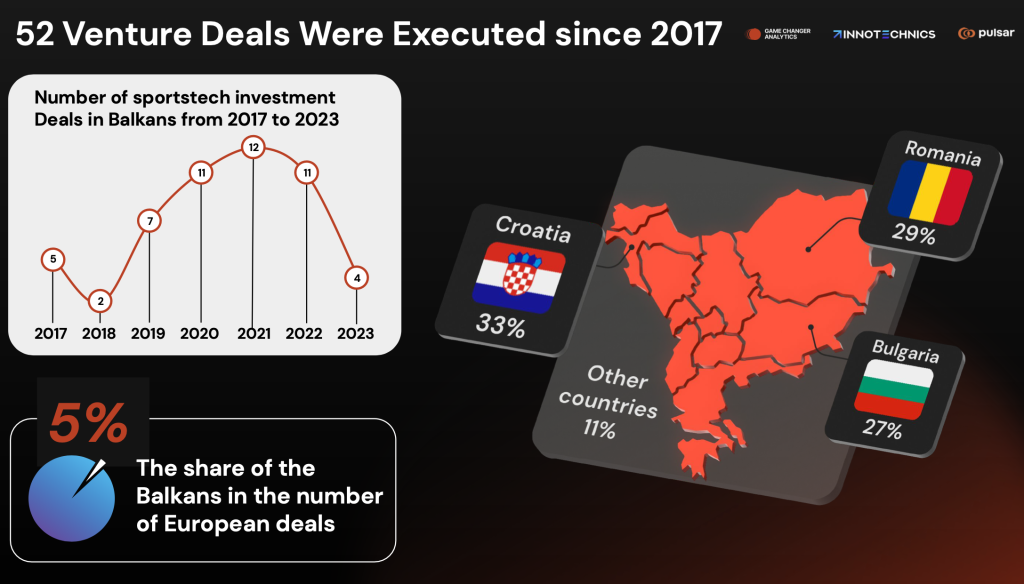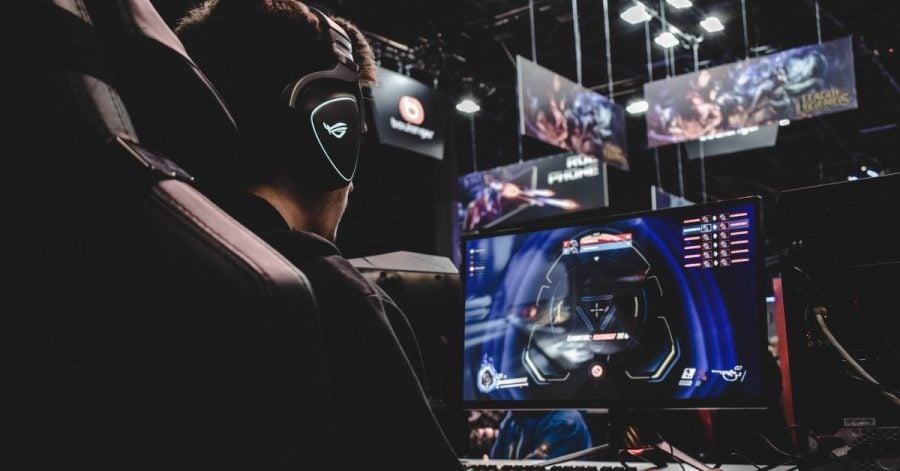Only have 1 minute? Here are 3 takeaways from the piece:
• In the past six years the region has seen 52 venture deals worth $248M
• Countries like Croatia, Romania and Bulgaria are ahead of the rest
• E-sports, gaming and betting are the dominant sectors in the industry
While football and basketball are one of the most popular sports on the planet, they are also the ones that are the least susceptible to innovation – and this goes especially for regions such as the Balkans, a new report regarding the region’s sportstech startup ecosystem shows.
According to the Balkan SportsTech Market report, a collaborative effort by Game Changer Analytics and Innotechnics, while these two sports are the most popular on the Balkans, there are also certain sectors that are taking the lead in capturing the attention and investment of entrepreneurs and investors alike.
During the past six years, sectors such as e-sports, gaming, and betting have emerged as the dominant trends, shaping the landscape of Balkan sports tech ecosystem which is made up of close to 300 startups, or 288 to be exact. Since 2017, a total of $248M have been invested into sportstech startups across the region in 52 venture deals, with countries such as Croatia, Romania and Bulgaria taking the lead, the report shows.

The biggest deal comes from Romania in the shape of online gaming company Superbet, which managed to secure an investment of $196M in 2019. Other notable deals include Slovenian FitBeat with an investment of $25M, and Croatian social media app Sportening with $5.3M, backed by the country’s biggest football superstar Luka Modric.
However, can this tempo be sustained over the next decade and what are the strengths and weaknesses of the ecosystem? Outdated infrastructure, lack of smart money, and a mindset that sees sports managers neglect sport as a product and lacking the motivation to develop it, are only a part of the drawbacks for the region.
Investment landscape for sportstech on the Balkans
While different sports are indeed having the attention of a large number of the Balkan population and worldwide as well, in order for the industry to keep up the pace with other industries when it comes to digitalization, there has to be more willingness to adapt to change.
“Football in Europe is the least digitalized sport – and the reason for this is because it’s so popular and it doesn’t need to fight that much for fans and customers. Other sports trying to compete with football are probably doing much better than football in this regard. But what we see in football is that technology’s going really deep. Even UEFA or FIFA just don’t allow any other technologies in their tournaments aside from optical tracking systems,” Roman Dzhurov, managing partner at Bulgarian football performance data company Ubitrack, said during the presentation of the report.
According to him, football and its fans can additionally see much more benefits from the use of such technologies.
“From my point of view, this affects not only the performance analytics, but fan engagement too, since you have a lot of statistics for the fans, a lot of stuff for the production, for the broadcaster for the betting industry, you have a lot of information which comes from the optical tracking. So the big players are coming in this market – not only for applications for engagement, but for deep technologies like what my company does because so far it was very hard to find smart money for sportstech. I think that digitalization brings a lot of opportunities not only for the fans or companies like mine, but for the whole ecosystem,” Dzhurov explains.
As the report also notes, the foundation to build on and improve is already here in the region, mainly in terms of human capital and talent.
“Our strong points are in the human capital, low costs and taxes to start projects, high involvement of the population in sports, as well as EU support programmes,” Mark Liepinsh, founder and CEO of Game Changer Analytics, says.
Croatia-based Fil Rouge Capital is one of the biggest investors in sportstech across the region. According to its principal Stevica Kuharski, while raising money for sportstech startups is by no means an easy feat, if there is a good business idea out there, then the capital will follow.
“It’s not easy to raise money or grants, especially in sports, because all teams need to pursue a good business opportunity if they want to be supported by investors like us. If there is no good business opportunity, there will be no business and there will be no investment. And this is the first thing that teams and founders have to have in mind. So how do we source themes? I’m personally present at lots of events, either onlineor in person from Slovenia, to Bulgaria, in Albania, or Serbia, and so on. And even if we are not fit with the team to invest into, we try to help them,” Kuharski says.
And what are the types of sportstech startups that can draw the attention of an investor? For Kuharski, they need to differ from the rest and bring something exciting to the table.
“One example is with Sports Tribe – these guys are really great, and they are the first ad-free supported streaming TV service for sports. It’s a streaming platform for sports that are not present on major channels. Imagine a sport where frogs could jump the farthest. If that sport would exist, Sports Tribal would be streaming it. So this is basically helping small soccer leagues and small sports that cannot get to the media to be present all over the world,” he explains.
For Marko Matusinskij from the Croatian Football Federation, implementing technologies such as AI for example can also prove very useful for different sports in the long run.
“In sports, sometimes we try to connect apples and oranges and it’s hard to compare assessment data with GPS data or heart rate data and to combine everything in one meaningful conclusion. So I think that technologies around that are going to be pretty interesting, and it’s something that will change the game,” Matusinskij says.
The challenges of integrating tech into sports
While some countries in the region, such as Romania, Bulgaria and Croatia are ahead when it comes to bigger deals in the sportstech industry then the rest – they are also here to show the way for others, such as Serbia or North Macedonia to follow.
When it comes to Bulgaria, it’s a case of having the talent and the business know-how, Ubitrack’s Dzhurov points out.
“First you have the talent, and second you have people who know how to put it in a business model and make money out of it. Sportal.bg for example was one of the big deals in the Bulgarian market- not just in sports, but in general. So I’d say it’s a combination of good ideas, a lot of talent, a good business model, and the right time and place. And I guess the other countries will start catching up sooner than later. It is a market that’s going to develop for the next 10 years, and new problems will emerge and with that new opportunities as well,” the Bulgarian entrepreneur says.
Countries like Serbia are grabbing lots of attention when it comes to having super star athletes such as tennis player Novak Djokovic or basketball star Nikola Jokic. However, when it comes to developing different sports and sport clubs locally and implementing innovation, the country lacks behind others in the region.
According to former basketball player Filip Sunturlic, this is mostly due to the old habits of looking at sports not as money making machines, but rather something different.
“In the past, sports weren’t seen as businesses or from the industry side, but they saw sports as a parasite of the state and the municipalities. So the lack of enthusiasm and the will of the employees inside of each sports organization or club in this region is because they are used to that kind of situation where you know that each month you will get some resources from the state or the municipalities. The number one problem is to develop sports as a business industry, and to do that you need to cut all these financial channels from previous times,” Sunturlic adds.
Regarding the use of technology in sports itself, there needs to be much bigger efforts by sports staff themselves in order to implement it and make their lives easier, the Serbian professional suggests.
“I have so many examples, we have brought so many technologies such as digital software for the coaches and so on to make it easier for them and they were just dismissing the idea of using technology. So you have someone next to them and kind of combine the two ways of communication – the modern and the old, traditional way of thinking. And thus, through the simple words, we’re going to have a ground level communication explaining how they can use certain software and technology.” Sunturlic concludes.








